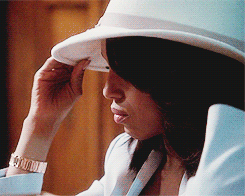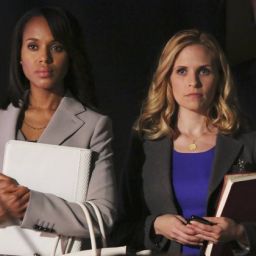I don’t watch a whole lot of television these days. I get most of my entertainment online, and when I do watch television programming, it’s on Hulu or Netflix. My favorite TV show of 2011 isn’t a traditional television show at all, however. It’s a web series called the Misadventures of Awkward Black Girl. The best way I can describe this show is “Black Grownup Daria” ABG chronicles the daily life of J, a socially inept black woman in her 20’s as she navigates work and dating in Los Angeles.
For obvious reasons, this show resonates with me. For all that I enjoy shows like Community and Parks and Recreation, ABG is the first time I’ve seen anything even remotely reflecting my life presented in such a format. So naturally, I’m a bit protective of the show. (The last web series I loved this much was “McCourt’s in Session” and there was only three episodes of those, so ABG is a vast improvement on a number of levels.)
In the past few months, the show’s popularity has soared. Issa Rae, the show’s creator/star has been on dozens of magazines and blogs and even CNN recently. It’s like Issa Rae has become the black Felicia Day, and I love it. When the show took to Kickstarter to raise funds to complete additional episodes, ABG fans stepped up to the plate and raised more than the projected goal of $30,000 to complete ABG’s season. Once again, Kevin Kelly’s 1000 True Fans model proves itself replicable:
A creator, such as an artist, musician, photographer, craftsperson, performer, animator, designer, videomaker, or author – in other words, anyone producing works of art – needs to acquire only 1,000 True Fans to make a living.
I don’t know if Issa Rae is yet making a living from ABG, but she is able to continue her work, improve the show and gain new fans. She’s really stepped up her game when it came to marketing and fan engagement, the college tour is a great idea, the t-shirts/merch are awesome and I love their approach of giving all the ABG characters their own fan pages. Issa Rae knows what she’s doing and understands what the fans want.
As the show’s popularity and buzz increases, there’s been talk of ABG moving to television. When the show first started, I was rooting for Issa Rae to be discovered by a network and picked up for TV, so maybe, for the first the first time in my TV watching life, I can see TV show that reflects my life in some way (what a concept) but with the success of the Kickstarter campaign, and the continuing grassroots support of ABG, I’ve begun to wonder if ABG (or other web series) needs traditional TV at all. TV execs like to pat themselves on the back for having a show with two black leads, but then only keep that show on for three weeks (though, to be honest “Undercovers” did suck) If fans continue to support Issa and ABG (i.e. if supporters become subscribers) who needs traditional TV?
My thoughts have echoed this blogger, who breaks down some of the math:
“…set up a website where fans can pay $5/mo for unlimited viewing. That’s a reasonable $60/year for each of us, and since a show like ABG has at least 25000 fans, that’s a generous $125,000/mo for them. ABG and Ktown Cowboys have shown us that we don’t need to see special effects or massive explosions, or ridiculous, over-the-top wardrobes. We just need to see us. We just need to see people who look like us, sound like us, and behave the way we do in real life, without someone else’s agenda coloring the script. I watch a 10-minute episode of ABG and it sends me straight to Cloud Nine. I end each episode feening for the next one. I see a dark chocolate, natural-haired black woman being witty and holding it down on her own show and I am catapulted into heaven.”
I think “K” is onto something, I love the idea of fan supported online series becoming the rule rather than the exception. And regardless , I think TV execs could takes notes on how popular web series like ABG are marketed to fans. However, I still want to see Issa Rae get the opportunity to create for mainstream television. Mainstream television needs this, more than ever.
Why? I saw “The Help” last month. I was on the fence about seeing it for the entire summer, I had conflicting feelings about the film from the time I heard of its release (I’ve not read the book) Once again we have a Civil Rights era film about Black people but written and directed by white people, and I was bracing myself for some painful stereotypes.
As I watched and enjoyed the film, I was still settled with a growing sense of unease. It’s 2011, Viola Davis and/or Octavia Spencer will likely get Oscar nominations for playing the same type of role that Hattie McDaniel played when she won in 1940. To be fair, Abileen and Minny are certainly no Mammy stereotypes; they’re well-acted and three dimensional characters.
But still, in 2011, this is one of the few times in Hollywood where African-American women are central within a story. That or Tyler Perry movies, and please let’s not go there today. That’s a whole other post. I can count on one hand the times I can walk into a movie theater or turn on TV and see black women’s lives portrayed where they’re not someone’s afterthought. And even then, it’s too often rooted in the past, or the convenient Hollywood narrative of the Strong Black Woman: challenged but unbowed, tough but maternal, drawing from superhuman reserves of emotional tenacity to face hatred and violence. With her sass.
Awkward Black Girl is the present. It’s the future. It’s the story of a black women as she lives and loves now. Awkward, funny, smart, wacky, romantic, vulnerable. And it’s only one story that can possibly be told from the many diverse stories of black women. Stories that have more “universal” resonance that Hollywood seems to think.
So yeah, do I want to see that on TV? In the movies? Hell yeah I do. I wish Issa Rae the very best of luck with ABG and her future endeavors. I think she can make a splash on TV while still keeping ABG real for the web.






[…] than the best of Hollywood, precisely because they are so deeply engaging with their audiences. A fan girl friend recently pointed me toward Issa Rae’s “The Misadventures of Awkward Black Girl,” which Rae […]
[…] I talked about ABG being the future of TV in a past post, and the Washington Post article is encouraging, but now I am not so sure about my proclamation. With the major investors and decision-makers in the online world being just as homogenous as Hollywood, I do wonder if online video will ultimately be much different in terms of providing any exceptional new opportunities for writers, producers and showrunners of color. So, while TV critics and bloggers mull over what Girls more-diverse second season, I’ll be over here wondering if it will take another 38 years to see a black female show lead on TV, and what it will take to avoid that. […]